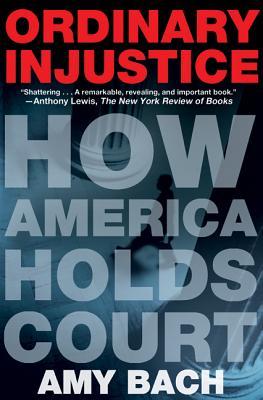"A groundbreaking book . . . revealing the systemic, everyday problems in our courts that must be addressed if justice is truly to be served."--Doris Kearns Goodwin
Attorney and journalist Amy Bach spent eight years investigating the widespread courtroom failures that each day upend lives across America. What she found was an assembly-line approach to justice: a system that rewards mediocre advocacy, bypasses due process, and shortchanges both defendants and victims to keep the court calendar moving. Here is the public defender who pleads most of his clients guilty with scant knowledge about their circumstances; the judge who sets outrageous bail for negligible crimes; the prosecutor who habitually declines to pursue significant cases; the court that works together to achieve a wrongful conviction. Going beyond the usual explanations of bad apples and meager funding, Ordinary Injustice reveals a clubby legal culture of compromise, and shows the tragic consequences that result when communities mistake the rules that lawyers play by for the rule of law. It is time, Bach argues, to institute a new method of checks and balances that will make injustice visible--the first and necessary step to reform.
"A groundbreaking book . . . revealing the systemic, everyday problems in our courts that must be addressed if justice is truly to be served."--Doris Kearns Goodwin
Attorney and journalist Amy Bach spent eight years investigating the widespread courtroom failures that each day upend lives across America. What she found was an assembly-line approach to justice: a system that rewards mediocre advocacy, bypasses due process, and shortchanges both defendants and victims to keep the court calendar moving. Here is the public defender who pleads most of his clients guilty with scant knowledge about their circumstances; the judge who sets outrageous bail for negligible crimes; the prosecutor who habitually declines to pursue significant cases; the court that works together to achieve a wrongful conviction. Going beyond the usual explanations of bad apples and meager funding, Ordinary Injustice reveals a clubby legal culture of compromise, and shows the tragic consequences that result when communities mistake the rules that lawyers play by for the rule of law. It is time, Bach argues, to institute a new method of checks and balances that will make injustice visible--the first and necessary step to reform.Paperback
$22.00